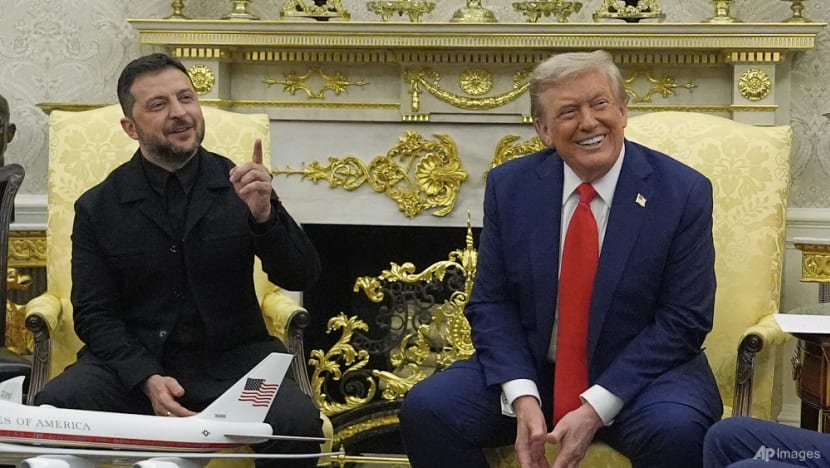Snap Insight: Why Trump-Zelenskyy meeting was a success, even with no Ukraine peace deal
The biggest display of European unity to support Ukraine seems to have worked – for now, says Chatham House’s Dr Samir Puri.

President Donald Trump meets with Ukraine's President Volodymyr Zelenskyy in the Oval Office at the White House, Aug 18, 2025, in Washington. (AP Photo/Julia Demaree Nikhinson)

This audio is generated by an AI tool.
LONDON: Nearly six months after United States President Donald Trump subjected him to ritual humiliation in front of cameras in the Oval Office, Ukrainian leader Volodymyr Zelenskyy made sure to put on a suit for talks on Monday (Aug 18) and thank his host repeatedly for efforts towards ending Russia’s war. But the cordial tone between the two men was not the headline.
Rather, the standout factor was the presence of European leaders who had travelled to Washington DC in a show of solidarity, the biggest display of Western unity in the cause of backing Ukraine since Mr Trump returned to office in January. And this seems to have worked – for now.
The European leaders – including British Prime Minister Keir Starmer, French President Emmanual Macron, NATO Secretary General Mark Rutte, and European Commission President Ursula von der Leyen – achieved their biggest immediate goal, which was to impress upon Mr Trump the importance of giving Ukraine robust security guarantees as part of any deal to end the fighting,
Great uncertainty remains as to whether a deal to end Russia’s war against Ukraine is in grasp. But the European leaders' patient work, many months in the making to present themselves as useful partners to Mr Trump’s efforts to end the war, seems to have paid off.
SECURITY GUARANTEES AND A TRILATERAL MEETING
For now, there is no deal to halt the fighting, and the US has dropped its aim of securing a ceasefire, holding out instead for a full peace deal instead.
But not only has Mr Trump acknowledged the importance of giving Ukraine security guarantees, for the first time, he has suggested a possible US role, even if what this means is still vague.
Still, all of this will come to nothing unless Russia agrees to continue the negotiation process and to negotiate the critical issue of territory.
Mr Trump sensationally paused his meetings to phone Mr Putin, but details of the Russian reaction are yet to be fully understood.
After the talks concluded, Mr Trump took to Truth Social to announce that a trilateral meeting could take place – something that has eluded his peacemaking efforts so far after Mr Putin declined to attend talks in Istanbul in May.
But there is absolutely no guarantee that Russia will agree to such a meeting, given Mr Putin talked of carving up Ukraine in talks with Mr Trump on Friday and has not shown he is willing to treat Mr Zelenskyy as a leader with legitimacy.
WILL VLADIMIR PUTIN HOLD OUT FOR MORE?
Still, Monday’s meeting should be considered a successful one. There is a sense of momentum in the long and winding peace process.
We can conclude two things. First, Mr Trump has dropped his demand for a ceasefire to precede any agreement, which mean the fighting is likely to continue alongside the talks.
Second, the technicalities of any deal are going to be incredibly hard – and very likely torturous – to agree on, for instance, how to manage the territory in the Donbas region in eastern Ukraine that remains the subject of fighting. And whether a “reassurance force” of European troops from nations friendly to Ukraine would deploy.
There is every possibility that Russia continues using the Trump-orchestrated negotiations to continue progressing its war goals.
One of Russia’s war aims - which was to forestall any possibility of Ukraine making progress in its quest for NATO membership, - has in effect been backed by Mr Trump, who publicly ruled out the possibility of Ukraine joining NATO. Mr Putin may continue to hold out for further improvements in his battlefield and negotiating positions.
Whether all that building momentum leads anywhere will be the question.
Dr Samir Puri is Director, Chatham House’s Centre for Global Governance and Security and a Visiting Lecturer on War Studies at King’s College London.


















